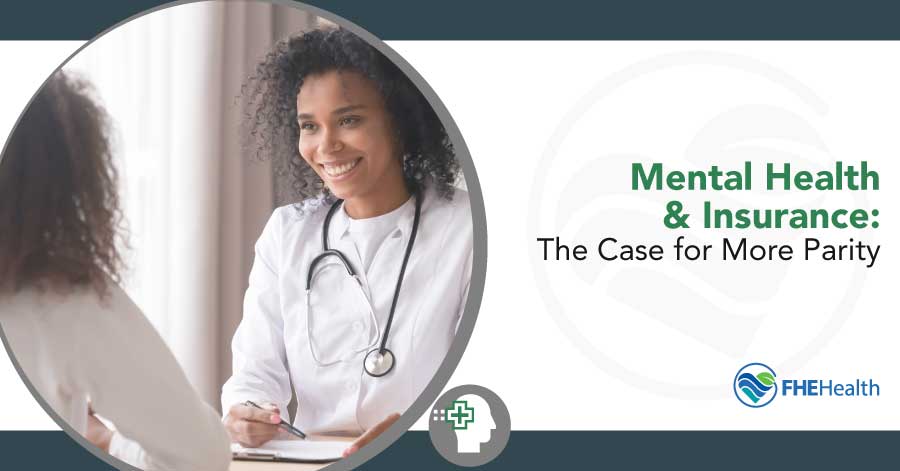
In the United States, citizens depend on their insurance coverage for all aspects of medical care, whether physical or mental. The Affordable Care Act promised mental health coverage that was on par with an individual’s physical health coverage. Unfortunately, for many people, that parity is still lacking.
You may spend 24 hours or more in the hospital under supervision for your mental health. This could occur if you’re in danger of harming yourself or require detoxing from a substance. The road to recovery is already challenging. You don’t want to receive unexpected medical bills after seeking critical mental health care. Discovering insurance won’t cover the bills will only worsen an already stressful situation.
Parity law in the United States needs further work to provide better coverage to those struggling with their mental health.
What Is Mental Health Parity?
Mental health parity means receiving the same coverage for mental health treatment as for physical health treatment. The call for mental health parity urges equality between mental and physical health care. The Mental Health Parity and Addiction Equity Act (MHPAEA) of 2008 is a federal law. It aims to prevent insurance providers from limiting mental health coverage while favoring physical health care benefits.
Under the law and in connection with the Affordable Care Act, the U.S. government sought to improve the accessibility of mental health care. The law specifically benefits those who can’t afford to pay out of pocket for such services.
What Is the Impact of the Federal Mental Health Parity Law?
The Mental Health Parity Act of 1996 ensures that large group coverage plans can’t limit mental health benefits in comparison to physical health benefits. However, this protection isn’t applicable to small-group coverage plans. So employees of small businesses may experience disparity in their mental health insurance coverage despite the Parity Act.
Lack of Priority From Insurance Providers
Currently, many insurance providers are failing to prioritize accessible mental health care for their plan members. Federal laws make it mandatory that large group plans offer a reasonable amount of mental health care coverage. However, some court cases, like Wit v. United Behavioral Health, found that the insurance provider’s guidelines make it difficult for plan members to seek care.
Many insurance plans only offer coverage for stabilizing mental health during a serious crisis. This doesn’t help individuals manage or treat the underlying conditions that result in a crisis. Some plans also don’t address what standards apply to children and adolescents. This prevents them from having a metric for when these dependents can seek care under a parent or guardian’s health care plan.
Such cases make it evident that there’s still a need for more emphasis on parity in mental health care. While coverage exists from a legal standpoint, the guidelines and phraseology used in these policies create obstacles for members to obtain treatment.
Some insurance companies may also have inadequate networks of providers for mental health care. Even if a member’s plan doesn’t contain criteria preventing them from seeking help, an inadequate number of providers may. A lack of available care may result in members:
- Traveling long distances to seek treatment
- Enduring long wait times before appointments are available
- Being forced to seek treatment from out-of-network providers because it’s more readily available
When an insurance provider has too small a network of approved places to seek mental health care, it’s an obstacle to treatment. All the people on that plan are queuing for limited appointments with the same providers. This is part of the problem with mental health care in the United States. Lack of access is still an obstacle for those who appear to have a high level of coverage based on parity law.
When wait times are too long for appointments, the coverage becomes irrelevant. With mental health conditions, the issues are usually time-sensitive. This is especially true for anxiety, depression and other conditions that are triggered by specific events. An individual may feel they need to speak to their psychologist within a few hours or days of a triggering incident. Otherwise, an appointment may not be as beneficial.
Similarly, being forced to seek treatment an unreasonable distance away can also be an obstacle to receiving care. This issue can be compounded if the plan member doesn’t have a car, or if they simply have a busy schedule. If they can’t travel to a distant provider regularly, they can’t use their plan benefits.
How Does Disparity Impact Mental Health?
When individuals with insurance have inadequate mental health coverage or can’t access the coverage they have, the results are problematic. Because mental illnesses aren’t visible the way physical ailments are, there’s a tendency to brush them aside or delegitimize them. People may try to continue functioning without seeking help until they reach a critical breaking point, which can be devastating.
When mental health care isn’t available and treatment is neglected, it also heightens the stigma surrounding mental illness. People may feel they can’t turn to loved ones for help because the healthcare system has failed them. Worse, they’re often forced to continue performing at work when they’re dealing with an internal struggle and have no support.
These examples are why employers should prioritize offering a health insurance plan with mental health parity. Access to mental health care benefits everyone, even if a condition doesn’t seem severe or a person appears to be “coping.” The ability to access talk therapy, cognitive behavioral therapy, and other mental health services can result in happier, more productive employees.
Seek Support If You Need It
If taking a mental health day doesn’t reduce your stress sufficiently or you’re struggling with a mental illness that requires treatment, help is available. Contact the team at FHE Health by calling (833) 596-3502. Our compassionate counselors are standing by 24/7 for your call. Begin your path to recovery by getting in touch with us today.






